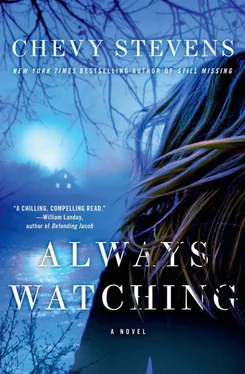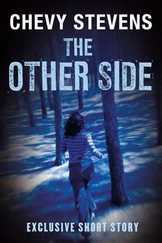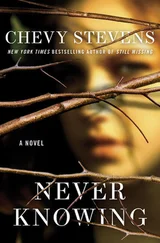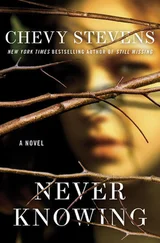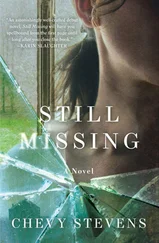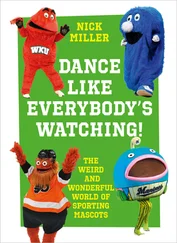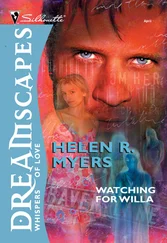She gazed at him now, her hands gripping her blanket tight around her.
“They wouldn’t let me say good-bye to Emily.”
This was the second time Heather had mentioned Emily.
“Emily didn’t want to leave with us, remember? She loves it at the center. I know you miss her, but you need to worry about yourself and the bab—”
Heather recoiled like he’d hit her.
Daniel said, “Oh, sweetie, I’m sorry. It was just habit.”
Heather’s eyes had gone dark and empty again, her hands dropped by her sides, palms up—defeated.
“It’s my fault I lost the baby. You’re mad at me.”
“It’s not your fault, Heather—and I’m not mad at you.” In a voice so loving and sad it made my heart hurt, he added, “You’re the most important thing in the world to me.”
“They said we should stay. They said it was better for our baby—and maybe they were right. I made you leave, and now the baby’s dead.”
“Heather, stop.” Daniel was rubbing her back. “Don’t say things like that.” He put his face close to hers. “Hey, look at me.” But Heather was just staring at the wall now, her expression blank.
I didn’t want to push things too much, especially with Heather starting to dissociate from the conversation, but I was concerned about why she was blaming herself so much for the loss of her baby.
“Why did you want to leave the center, Heather?”
She began to rock, her arms wrapped around her body.
“They said that all adults are the child’s parents. So everyone helps raise them, and they don’t even stay with you.”
The horror in her face made it clear that this hadn’t sat well with her.
“At the center, they believe it’s better for the baby’s spiritual growth to be loved by many hearts,” Daniel said. “They have highly trained caregivers.”
This center sounded highly controlling. I turned to Heather.
“But you didn’t want to share your child?”
She nodded and glanced at Daniel, who stared down at Heather’s bandages again. She looked like she wanted to explain herself more, but then she reached out and held Daniel’s hand. He gave it a small squeeze.
“I think I was wrong, though,” she said. “We should’ve stayed. Then I wouldn’t have miscarried.”
I said, “How can you know that you wouldn’t have miscarried even if you had stayed? Did they actually tell you that you were responsible?”
“They didn’t say it was our fault,” Daniel said. “They were just worried that Heather had gotten herself too stressed out by moving.”
In other words, they had implied that it was her fault.
“What is this center called?” I said.
Daniel sat straighter, his shoulders proud.
“The River of Life Spiritual Center.”
Something tickled at the back of my mind, followed by an uncomfortable feeling of dread settling in my stomach.
“Who runs it?”
“Aaron Quinn. He’s the director of all the programs at the center.”
Aaron Quinn. He said Aaron Quinn.
It couldn’t be the same man.
Heather’s voice was a whisper. “Most of the members call it the commune.”
The commune. I hadn’t heard that name in years. I hadn’t wanted to hear it ever again. I stared at Heather, trying to think, my heart thudding in my ears.
“Dr. Lavoie?” Heather’s blue eyes were full of sorrow and pain. “Do you think it’s my fault the baby died?”
It took a second for me to refocus my thoughts. You have a patient, and she needs your help.
“No, I don’t think it’s your fault. You made a decision you thought was best for your child—you were just being good parents.” I talked on for a minute or two, heard the comforting words coming out of my mouth. But all the while my head was filled with a dull roar, the sound of fate and life colliding. Because what I couldn’t tell them was that I knew Aaron Quinn.
I knew exactly who he was.
When I was twenty-five, I’d decided to go back to school and was attending the University of Victoria for a degree in science. I’d learned ways to deal with tight hallways and stairwells, mostly by avoiding them, but during final exams, all the outside lots were full and I’d been forced to park underground. I’d been overwhelmed by panic in the dark space and hadn’t been able to step into the elevator. I had to walk the long way around, while hyperventilating in big gasps of air, my hair soaked with sweat, earning me stares from every student I passed. I’d missed the beginning of my exam and the door was closed, so I failed the course. It had been a humiliating experience, and I began therapy soon after.
While discussing my childhood with the therapist, I shared that my mother had run away with my brother and me to a commune when I was thirteen. The commune, led by a man named Aaron Quinn, had been built beside the Koksilah River on the outskirts of Shawnigan Lake, which is a small community about thirty minutes north of Victoria—on the southern tip of Vancouver Island. We lived there for eight months until my father came to get us.
My therapist had found this period in my life fascinating and wanted to explore it further. Especially because I’d been unable to pinpoint when my claustrophobia had developed, but I had more distinct memories of it interfering with my life after we’d moved back home. I slept with a night-light and my door open—I couldn’t even clean the barn without hyperventilating, and Robbie, my brother, had to take over the chore for me.
Believing that my claustrophobia was linked to suppressed trauma, from something that had happened while at the commune, my therapist had suggested we try hypnosis as a way to unlock my memories. Recovered Memory Therapy was a popular treatment at the time, and he felt it was the best way to recover any lost memories. I’d been hesitant at first—I had enough painful memories already.
My family life hadn’t been easy growing up. My father, a strict German, was hard to please but easy to anger. His temper often turned violent, and we spent much of our childhood hiding while he was on a drunken rampage, smashing his huge fists into the windows or knocking our mother around. If we intervened, she’d just scream that we were making it worse. He worked on a fishing boat, and my mother, who was unbalanced when he was around, became downright dangerous when he was away. She was either on top of the world, buying us gifts we couldn’t afford and taking us on trips all over the island, or shut in her room for days, the curtains pulled down and the door locked. She’d often threaten to kill herself, the pills in her hands as we pleaded with her until she finally handed them over. Other times she’d take off in the truck, drunk or high on medication, not returning until the morning. Now I would diagnose her as manic-depressive, but back then all we knew was that my mother’s moods were a slippery slope and we never knew where she would land.
The only person I could depend on was Robbie, my older brother by three years, whom I followed everywhere. He was my first best friend, my only friend growing up on a ranch where all our school friends lived miles away. Though we were very different, me with my love of books and school, he with mechanics and carpentry, we’d spend hours in the woods, building forts and playing army. Robbie wanted to join the army as soon as he turned eighteen, but I secretly hoped he’d change his mind. I didn’t know how I would survive without him.
One February, just before I turned thirteen, my father was away on the boats, and we were at the local corner store with my mom. Robbie was waiting in the truck. Mom was in one of her down phases, which meant she’d barely eaten for days—neither had we—and she was listlessly picking up items: Kraft Dinner, tomato soup, bread, peanut butter, wieners, hot dog buns, cereal. Her hair, normally a glossy, shiny black, was dull and limp. Mom’s hair started going gray in her thirties, though she never lived long enough for it to turn completely silver. When I also started going gray young, I dyed my hair for years, wondering sometimes if it was more out of fear of becoming my mother than vanity.
Читать дальше
